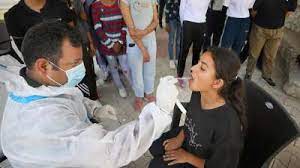BENGALURU: The World Health Organisation (WHO) on Tuesday classified the JN.1 coronavirus strain as a “variant of interest” and said current evidence shows risk to public health was low from the strain.
At least two experts told Reuters that while the strain can evade the immune system and transmit more easily than other currently circulating variants, it has not shown any signs of more severe disease.
While there might be more cases with the variant, JN.1 doesn’t pose a greater risk, said Andrew Pekosz, a virologist at the Johns Hopkins Bloomberg School of Public Health.
JN.1 was previously classified a variant of interest as part of its parent lineage BA.2.86, but WHO has now classified it as a separate variant of interest.
WHO said current vaccines would continue to protect against severe disease and death from JN.1 and other circulating variants of the Covid-19 virus.
The US Centres for Disease Control and Prevention (CDC) said earlier this month the subvariant JN.1 makes up about an estimated 15% to 29% of cases in the United States as of December 8, according to the agency’s latest projections.


